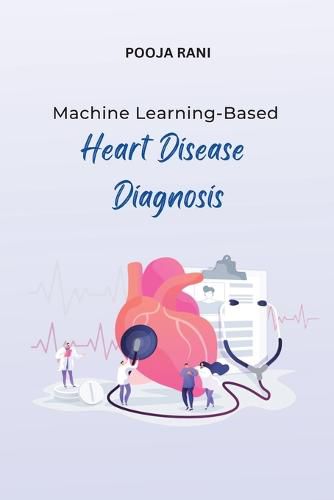Readings Newsletter
Become a Readings Member to make your shopping experience even easier.
Sign in or sign up for free!
You’re not far away from qualifying for FREE standard shipping within Australia
You’ve qualified for FREE standard shipping within Australia
The cart is loading…






This title is printed to order. This book may have been self-published. If so, we cannot guarantee the quality of the content. In the main most books will have gone through the editing process however some may not. We therefore suggest that you be aware of this before ordering this book. If in doubt check either the author or publisher’s details as we are unable to accept any returns unless they are faulty. Please contact us if you have any questions.
Machine learning-based heart disease diagnosis is a rapidly evolving area of research that aims to improve the accuracy and efficiency of cardiovascular disease diagnosis using artificial intelligence (AI) algorithms. The use of machine learning models trained on medical imaging and electronic health record (EHR) data has shown promising results in predicting and diagnosing heart disease, as well as identifying risk factors and potential treatments. Predictive models can extract relevant features from EHR data and medical images to identify patterns and predict future outcomes. The use of deep learning algorithms and expert systems can further improve the sensitivity, specificity, and accuracy of heart disease diagnosis. The potential benefits of machine learning-based heart disease diagnosis include improving clinical decision-making, providing personalized treatment plans, and reducing healthcare costs. Additionally, machine learning-based diagnosis has the potential to improve the speed and accuracy of diagnosis, leading to improved patient outcomes. Overall, machine learning-based heart disease diagnosis is an important area of research with significant potential for improving cardiovascular health and patient care.
$9.00 standard shipping within Australia
FREE standard shipping within Australia for orders over $100.00
Express & International shipping calculated at checkout
This title is printed to order. This book may have been self-published. If so, we cannot guarantee the quality of the content. In the main most books will have gone through the editing process however some may not. We therefore suggest that you be aware of this before ordering this book. If in doubt check either the author or publisher’s details as we are unable to accept any returns unless they are faulty. Please contact us if you have any questions.
Machine learning-based heart disease diagnosis is a rapidly evolving area of research that aims to improve the accuracy and efficiency of cardiovascular disease diagnosis using artificial intelligence (AI) algorithms. The use of machine learning models trained on medical imaging and electronic health record (EHR) data has shown promising results in predicting and diagnosing heart disease, as well as identifying risk factors and potential treatments. Predictive models can extract relevant features from EHR data and medical images to identify patterns and predict future outcomes. The use of deep learning algorithms and expert systems can further improve the sensitivity, specificity, and accuracy of heart disease diagnosis. The potential benefits of machine learning-based heart disease diagnosis include improving clinical decision-making, providing personalized treatment plans, and reducing healthcare costs. Additionally, machine learning-based diagnosis has the potential to improve the speed and accuracy of diagnosis, leading to improved patient outcomes. Overall, machine learning-based heart disease diagnosis is an important area of research with significant potential for improving cardiovascular health and patient care.